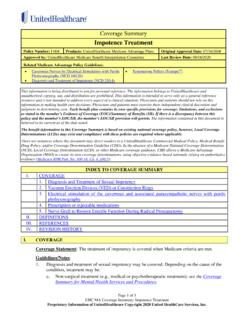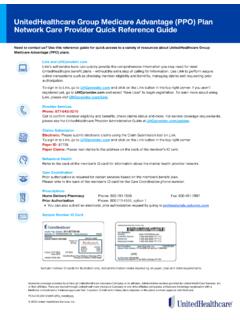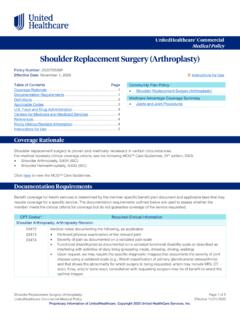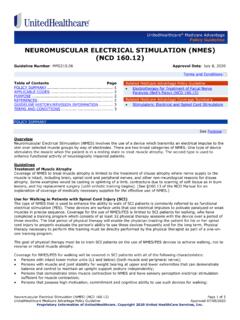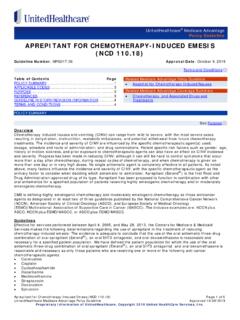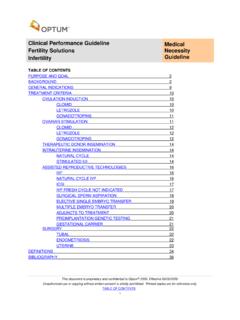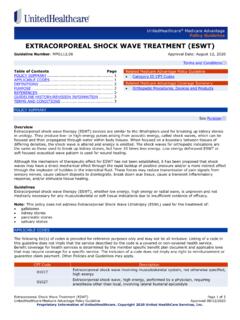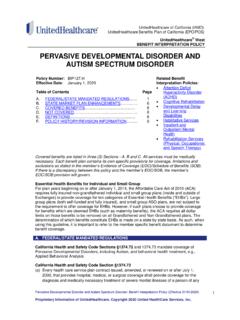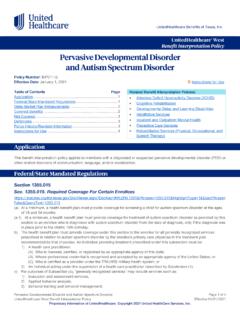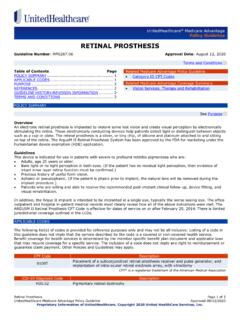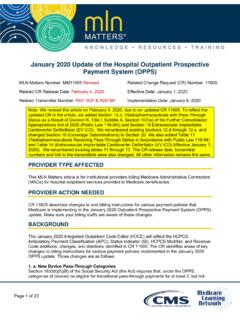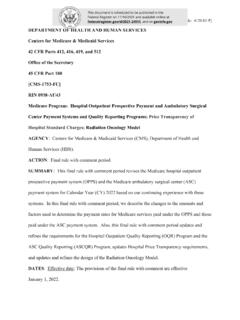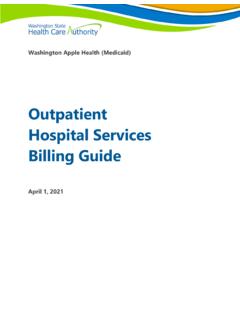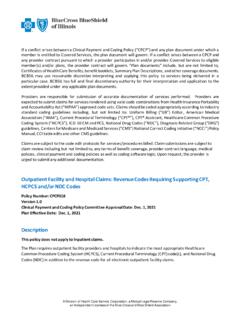Transcription of Hospital Services (Inpatient and Outpatient)
1 Hospital Services ( inpatient and outpatient ) Page 1 of 6 UnitedHealthcare Medicare Advantage Coverage Summary Approved 08/17/2021 Proprietary Information of UnitedHealthcare. Copyright 2021 United HealthCare Services , Inc. UnitedHealthcare Medicare Advantage Cover a ge Summa r y Hospital Services ( inpatient and outpatient ) Policy Number: Approval Date: August 17, 2021 Instructions for Use Table of Contents Page Coverage Guidelines .. 1 inpatient Hospital Services .. 1 outpatient Hospital Services .. 2 outpatient Surgical Procedures Site of Service .. 3 Religious Nonmedical Health Care Institutions .. 3 Long Term Care Hospitals .. 3 Never Events .. 4 Policy History/Revision Information .. 4 Instructions for Use .. 5 Coverage Guidelines Hospital Services ( inpatient and outpatient ) are covered when Medicare criteria are met. All Hospital Services must be reasonable and necessary to be covered.
2 Decisions on the setting for delivery of healthcare Services should be based on nationally recognized guidelines and evidence-based medical literature. The CMS Hospital inpatient Patient Payment System (IPPS) Final Rule provides clarity when inpatient Hospital admissions are generally appropriate for payment. Detailed information on the final rule is available at (Accessed August 9, 2021) COVID-19 Public Health Emergency Waivers & Flexibilities: In response to the COVID-19 Public Health Emergency, CMS has updated some guidance for certain Hospital Services . For a comprehensive list of Coronavirus Waivers & Flexibilities, refer to (Accessed August 9, 2021) inpatient Hospital Services The physician or other practitioner responsible for a patient's care at the Hospital is also responsible for deciding whether the patient should be admitted as an inpatient . Physicians should use the expectation of the patient to require Hospital care that spans at least two midnights period as a benchmark, , they should order admission for patients who are expected to require a Hospital stay that crosses two midnights and the medical record supports that reasonable expectation.
3 However, the decision to admit a patient is a complex medical judgment which can be made only after the physician has considered a number of factors, including the patient's medical history and current medical needs, the types of facilities available to inpatients and to outpatients, the Hospital 's by-laws and admissions policies, and the relative appropriateness of treatment in each setting. Factors to be considered when making the decision to admit include such things as: The severity of the signs and symptoms exhibited by the patient; The medical predictability of something adverse happening to the patient; Related Medicare Advantage Policy Guidelines Surgical or Other Invasive Procedure Performed on the Wrong Body Part (NCD ) Surgical or Other Invasive Procedure Performed on the Wrong Patient (NCD ) Wrong Surgical or Other Invasive Procedure Performed on a Patient (NCD ) Hospital Services ( inpatient and outpatient ) Page 2 of 6 UnitedHealthcare Medicare Advantage Coverage Summary Approved 08/17/2021 Proprietary Information of UnitedHealthcare.
4 Copyright 2021 United HealthCare Services , Inc. The need for diagnostic studies that appropriately are outpatient Services ( , their performance does not ordinarily require the patient to remain at the Hospital for 24 hours or more) to assist in assessing whether the patient should be admitted; and The availability of diagnostic procedures at the time when and at the location where the patient presents. For coverage to be appropriate under Medicare for an inpatient admission, the patient must demonstrate signs and/or symptoms severe enough to warrant then need for medical care and must receive Services of such intensity that they can be furnished safely and effectively only on an inpatient basis. If the physician or healthcare professional is uncertain if an inpatient admission is appropriate, then the physician or healthcare professional should consider admitting the patient for observation. Refer to the Coverage Summary titled Observation Care ( outpatient Hospital ) for coverage information.
5 Refer to the: Medicare Benefit Policy Manual, Chapter 1, 10 inpatient Hospital Services Covered Under Part A. Quality Improvement Organization Manual, Chapter 4, 4110 Admission/Discharge Review. National Coverage Determination (NCD) for Hospital and Skilled Nursing Facility Admission and Diagnostic Procedures ( ) (Accessed August 9, 2021) inpatient Level of Care Review: For more detailed inpatient Hospital Services definitions/clinical criteria and guideline, refer to the UnitedHealthcare Commercial Utilization Review Guideline titled Elective inpatient Services . CMS inpatient Only List: The Social Security Act allows CMS to define Services that are appropriate for payment under the outpatient prospective Payment System (OPPS). Under this authority, CMS also identifies Services that should be performed in the inpatient setting. These Services are itemized on the inpatient list, also known as the inpatient -only list.
6 The inpatient only list can be accessed at Addendum E. Final HCPCS Codes that Would Be Paid Only as inpatient Procedures for 2021. On December 2, 2020, CMS finalized the proposal to eliminate the inpatient Only (IPO) list over a three-year transitional period, beginning with the removal of approximately 300 primarily musculoskeletal-related Services , with the list completely phased out by CY 2024. This will make these procedures eligible to be paid by Medicare in the Hospital outpatient setting when outpatient care is appropriate, as well as maintain our ability to pay for these Services in the Hospital inpatient setting when inpatient care is appropriate, as determined by the physician. Additionally, procedures removed from the IPO list may become subject to medical review activities related to the 2-midnight rule. CMS has provided a table that includes Services removed from the inpatient -only list for CY 2021 starting on page 709 of the final rule.
7 The final rule can be accessed at The fact sheet on the Calendar Year (CY) 2021 OPPS/ASC Payment System final rule (CMS-1736-F) can be accessed at (Accessed August 9, 2021) outpatient Hospital Services Hospitals provide two distinct types of Services to outpatients: Services that are diagnostic in nature, and other Services that aid the physician in the treatment of the patient. Part B covers both the diagnostic and the therapeutic Services furnished by hospitals to outpatients. The rules in this section pertaining to the coverage of outpatient Hospital Services are not applicable to the following Services . Physical therapy, speech-language pathology or occupational therapy Services when they are furnished as therapy meaning under a therapy plan of care. See chapter 15, sections 220 and 230 of Medicare Benefit Manual for coverage and payment rules for these Services , which are paid at the applicable amount under the physician fee schedule.
8 Services that are covered and paid under the End Stage Renal Disease prospective Payment System. Refer to Chapter 11, End Stage Renal Disease (ESRD) of this manual, for rules on the coverage of these Services . Hospital Services ( inpatient and outpatient ) Page 3 of 6 UnitedHealthcare Medicare Advantage Coverage Summary Approved 08/17/2021 Proprietary Information of UnitedHealthcare. Copyright 2021 United HealthCare Services , Inc. outpatient Hospital Services are covered. The Services and supplies must be furnished as an integral, although incidental, part of the physician's professional service in the course of diagnosis or treatment of an illness or injury. The Services and supplies must be furnished on a physician's order and under physician supervision (physician is on the premise and involved in evaluation of the patient). Refer to the Medicare Benefit Policy Manual, Chapter 6, 20 outpatient Hospital Services .
9 (Accessed August 9, 2021) outpatient Surgical Procedures Site of Service To determine the appropriate site of service, refer to the UnitedHealthcare Commercial Utilization Review Guideline titled outpatient Surgical Procedure Site of Service. Religious Nonmedical Health Care Institutions (RNHCIs) Services in a Medicare certified Religious Nonmedical Health Care Institutions (RNHCIs) are covered under UnitedHealthcare Medicare. However, religious aspects of care provided in RNHCIs are not covered. In order to be eligible for care in a RNHCI, an individual must have a condition that would allow them to receive inpatient Hospital or extended care Services . In addition, the individual must make an election that they are conscientiously opposed to the acceptance of nonexcepted medical treatment. Excepted medical treatment is medical care or treatment that is received involuntarily or that is required under Federal, State or local law.
10 Nonexcepted medical treatment is any other medical care or treatment other than excepted medical treatment. Notes: RNHCI Services equivalent to a Hospital or extended care level of care in a qualified RNHCIs are limited to those who elected RNHCI Services . The same benefit restrictions and requirements such as benefit period, prior authorization and all copayment/coinsurance will apply. Any RNHCI provider that does not have a contract with UnitedHealthcare Medicare must accept, as payment in full, the amounts that the provider could collect if the member was enrolled in original Medicare. Refer to the Medicare Benefit Policy Manual, Chapter 1, 130 Religious Nonmedical Health Care Institution (RNHCI) Services . (Accessed August 9, 2021) Long Term Care Hospitals (LTCH) LTCHs are certified under Medicare as short-term acute care hospitals that have been excluded from the acute care Hospital inpatient prospective payment system (PPS) under 1886(d)(1)(B)(iv) of the Act and, for Medicare payment purposes, are generally defined as having an average inpatient length of stay of greater than 25 days.
